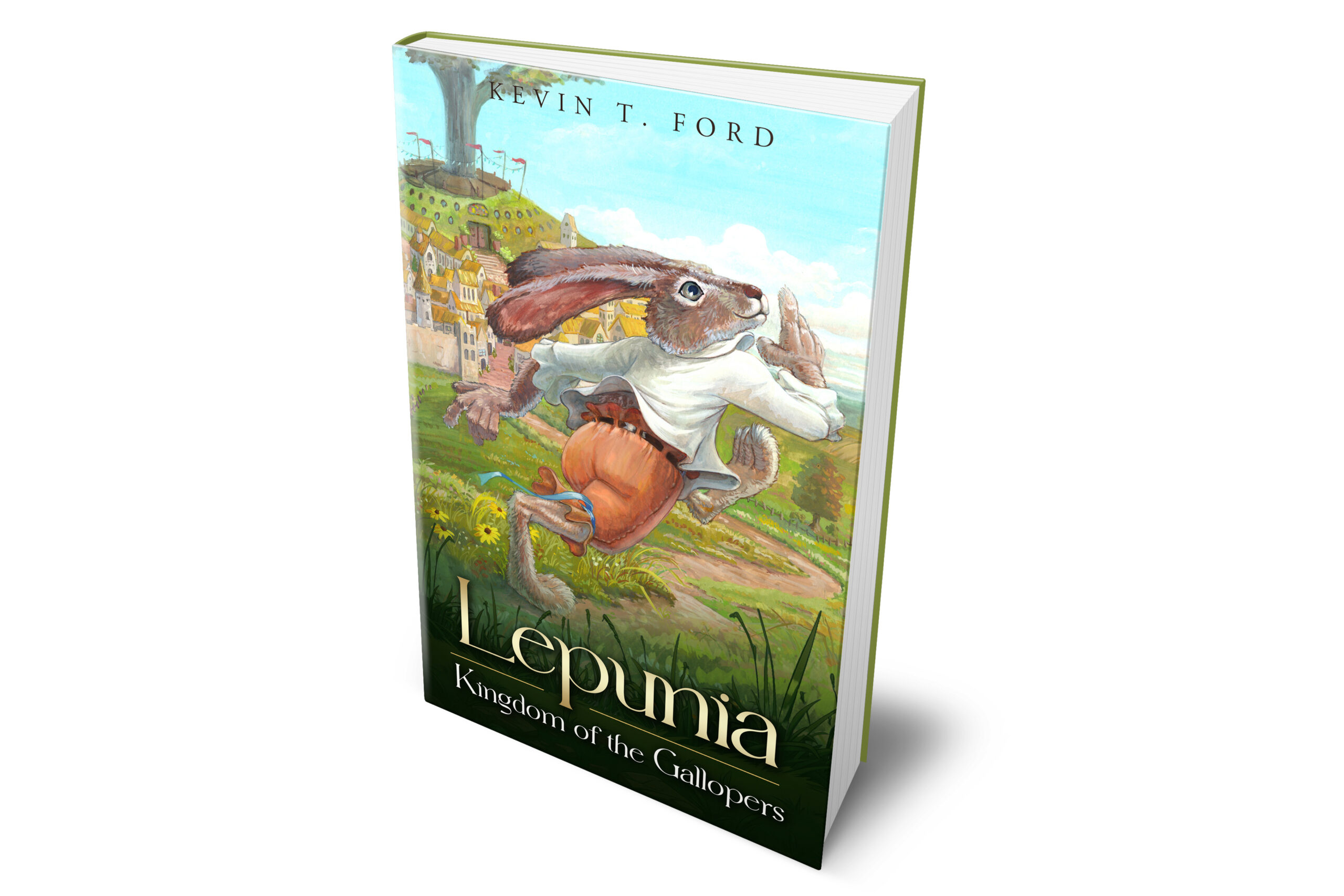Lepunia will catch you up, carry you away, and set you down—right back in Kansas. But conveyed from a rabbit’s-eye view, it might as well be Oz. It was with some surprise that I realized, on reflection, that no magic takes place in these pages. None but that conjured by Ford’s lyrical descriptions. One part Narnia and one part Little House on the Prairie, Lepunia offers up an enchanted middle America peopled with rabbits, squirrels, coyotes, owls, prairie dogs, ferrets, and more. Cottonwoods, hills, lakes, and burrows become ancestral palaces and legendary landmarks, skillfully rendered in Michael Genova’s lavish sketches and eye-catching cover art.
In this first book of a planned trilogy, the curtain rises on the eve of Founding Day in the township of Lepunia (from the Latin lepus—hare). The festival marks not only the anniversary of the settlement but graduation from the academy for jackrabbit friends Lily, Fluff, and Jackson. Lily hopes to be admitted to the artists’ guild. Fluff expects to follow his father’s profession of baker. And the dearest desire of fleet-footed Jackson is induction into the Gallopers, an elite guard of jackrabbits tasked with defending the kingdom and conveying messages to its farthest reaches.
Given the flurry of preparations—and the ominous appearance of coyote tracks down by the river—it is almost inevitable that Founding Day will go awry. And indeed, it does, in the worst way possible. During the closing ceremony on Lone Jack’s Hill, a devastating attack takes out the entire leadership of the kingdom. The remaining populace are ordered to their homes, cowering under the teeth of coyote soldiers.
In the crush of fleeing rabbits, Jackson becomes separated from his family. With the words of his Galloper oath fresh in his mind, he determines to sneak past the coyote guards at the town gates and warn the surrounding settlements of impending danger. Once outside, however, his plan is thwarted by a tornado that picks him up and spits him out into a lake far from home.
Fortunately for all concerned, a couple of boating prairie dogs fish Jackson out and take him home to Prairie Dog Town. While recovering from his clash with the forces of nature, Jackson learns the prairie dogs have been ousted from their ancestral home, Chalkburrow, by the owl Talon and his army of ferrets. The prairie dog queen, Grassroot, directs Jackson to an enigmatic jackrabbit hermit for advice on how to return to Lepunia and help his compatriots.
Meanwhile, back in Lepunia, Jackson’s surviving family undertake their own plans of resistance and escape. Fluff and Lily, for their part, set out in search of Jackson. Weeks pass and winter sets in. Just as snow threatens not only their quest but their lives, the pair stumbles upon Castle Quivira, the abode of a companionable armadillo and porcupine. Anty and Sassafrass make the jackrabbits welcome and insist they stay until the weather warms.
Jackson’s visit with the hermit yields even more than he anticipated. He returns to Prairie Dog Town equipped with valuable knowledge and the Book of Jackrabbit Tales. But before setting out for Lepunia he must aid his friends in retaking Chalkburrow. When least expected, Lily and Fluff bound onto the scene. The book closes with Jackson and a band of loyal partisans—old as well as new—poised for the mission of liberating Lepunia from its foes.
Along with a well-conceived plot, Lepunia boasts a charming host of unlikely heroes, quirky comrades, and cheer-worthy moments. Qualities such as loyalty, courage, sacrifice, and service are repeatedly exemplified, and the value of internal character over external accomplishments comes often into view.
In the heat of the Founding Day attack, just before striking the fatal blow to friar king Aster, his assassin taunts him: “You are weak. A pauper masquerading as a king” (p. 113).
King Aster responds: “Though fire will consume and sword slay and every outward manifestation of Lepunia vanish, the kingdom shall not perish. The kingdom is within us. It cannot be destroyed.”
Lepunia’s founder, Lone Jack, had dreamed of a place where all creatures could live in peace. The citizens of Lepunia can enact the harmonious vision wherever they find themselves.
But the events of the story underscore the elusive nature of peace before the all-too-present problem of evil. In Jackson’s conversation with the hermit, he protests that in the legends, the Swiftness (the Creator) always delivers those in need. Why, then, didn’t he stop the carnage on Lone Jack’s Hill on Founding Day?
“Are you certain he wasn’t there in that moment?” the hermit replies (p. 269). Without delving deeply into the mystery of divine sovereignty or the problem of evil, the hermit suggests Jackson’s survival and potential to return in strength is the provision of the Swiftness.
In a conversation reminiscent of Sam and Frodo’s exchange in Mordor, the hermit tells Jackson: “There is no difference between the stories in our book of tales and the one you are part of now. They are the same story, only different chapters” (p. 268).
Debut author Ford effectively wields the essentials of modern fantasy—atmospheric scenes, iconic items, stirring nobility. His complex world building is complete with detailed back story, family history, myth, legend, poems, songs, nursery rhymes, and prophecies. The only missing element is a full-fledged language, à la Tolkien. I suspect Ford probably toyed with the notion. Fans of Redwall, The Wingfeather Saga, The Green Ember series, and the like will welcome the opportunity to dive into Lepunia, Kingdom of the Gallopers.
- Birthday with the Bard - April 10, 2024
- What History Is Made Of - March 25, 2024
- Books for Black History Month, pt. 2 - February 19, 2024

Leave a Reply